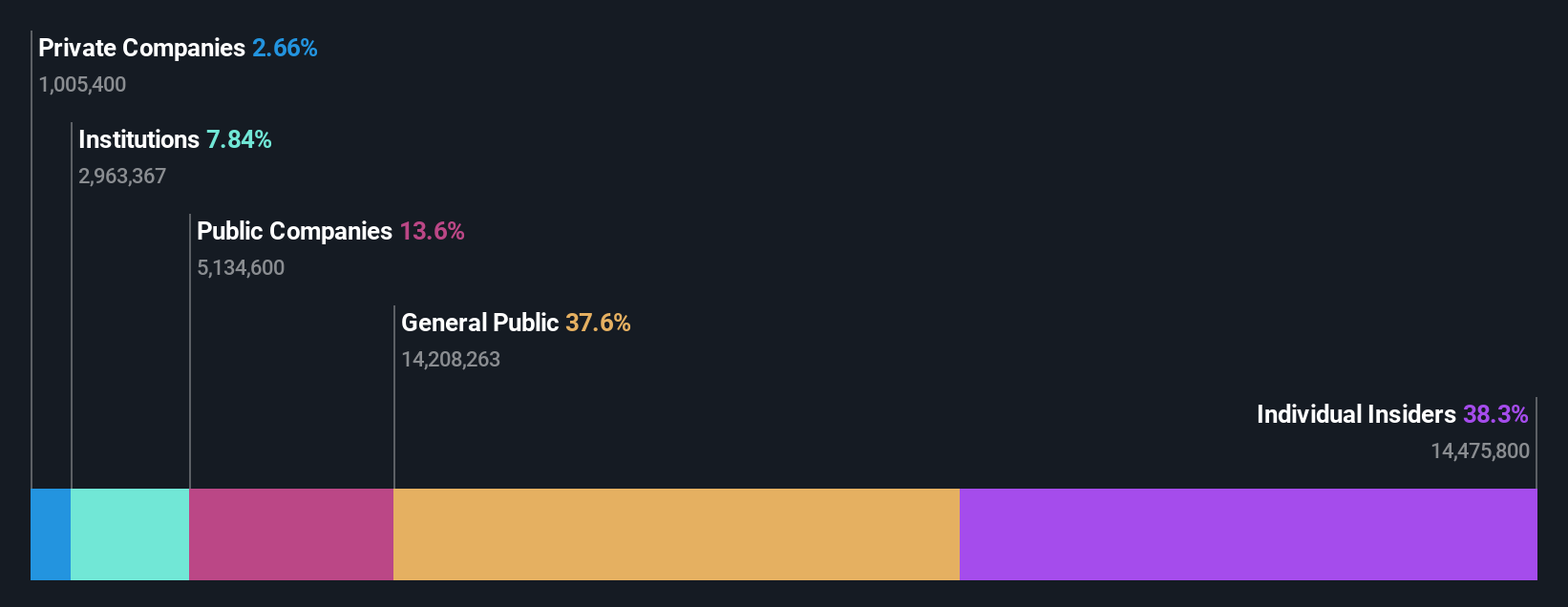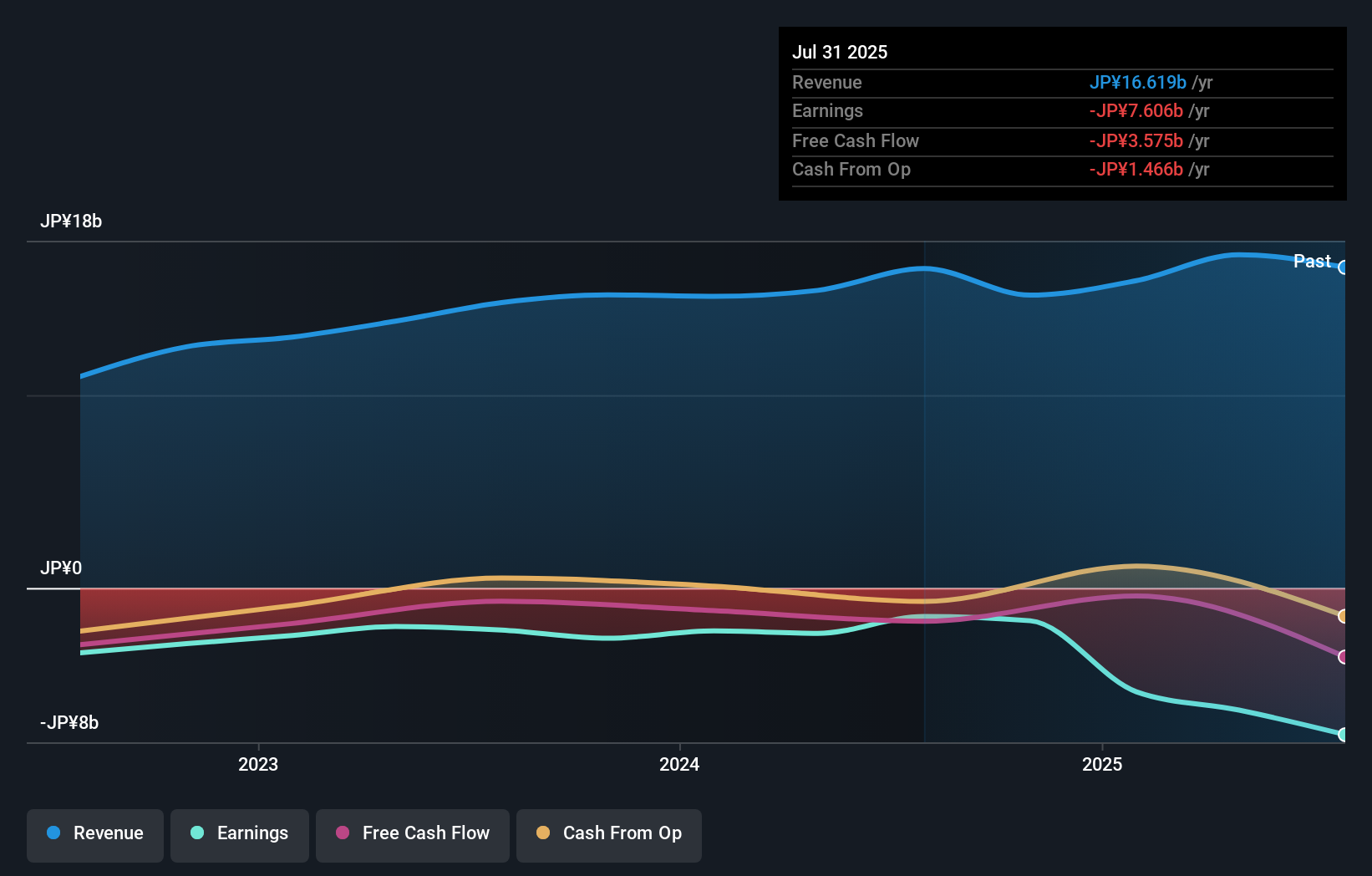Recent 10% pullback would hurt Access Co., Ltd. (TSE:4813) insiders
Key Insights
- Access' significant insider ownership suggests inherent interests in company's expansion
- 53% of the business is held by the top 3 shareholders
- Ownership research, combined with past performance data can help provide a good understanding of opportunities in a stock
Every investor in Access Co., Ltd. (TSE:4813) should be aware of the most powerful shareholder groups. The group holding the most number of shares in the company, around 38% to be precise, is individual insiders. In other words, the group stands to gain the most (or lose the most) from their investment into the company.
And last week, insiders endured the biggest losses as the stock fell by 10%.
Let's delve deeper into each type of owner of Access, beginning with the chart below.
Check out our latest analysis for Access

What Does The Institutional Ownership Tell Us About Access?
Many institutions measure their performance against an index that approximates the local market. So they usually pay more attention to companies that are included in major indices.
Access already has institutions on the share registry. Indeed, they own a respectable stake in the company. This can indicate that the company has a certain degree of credibility in the investment community. However, it is best to be wary of relying on the supposed validation that comes with institutional investors. They too, get it wrong sometimes. If multiple institutions change their view on a stock at the same time, you could see the share price drop fast. It's therefore worth looking at Access' earnings history below. Of course, the future is what really matters.

We note that hedge funds don't have a meaningful investment in Access. The company's largest shareholder is Tatsuro Kiyohara, with ownership of 33%. NTT, Inc. is the second largest shareholder owning 14% of common stock, and SBI Asset Management Co., Ltd. holds about 5.8% of the company stock.
A more detailed study of the shareholder registry showed us that 3 of the top shareholders have a considerable amount of ownership in the company, via their 53% stake.
While it makes sense to study institutional ownership data for a company, it also makes sense to study analyst sentiments to know which way the wind is blowing. As far as we can tell there isn't analyst coverage of the company, so it is probably flying under the radar.
Insider Ownership Of Access
While the precise definition of an insider can be subjective, almost everyone considers board members to be insiders. Company management run the business, but the CEO will answer to the board, even if he or she is a member of it.
Most consider insider ownership a positive because it can indicate the board is well aligned with other shareholders. However, on some occasions too much power is concentrated within this group.
It seems insiders own a significant proportion of Access Co., Ltd.. It has a market capitalization of just JP¥21b, and insiders have JP¥7.9b worth of shares in their own names. We would say this shows alignment with shareholders, but it is worth noting that the company is still quite small; some insiders may have founded the business. You can click here to see if those insiders have been buying or selling.
General Public Ownership
With a 38% ownership, the general public, mostly comprising of individual investors, have some degree of sway over Access. This size of ownership, while considerable, may not be enough to change company policy if the decision is not in sync with other large shareholders.
Public Company Ownership
It appears to us that public companies own 14% of Access. It's hard to say for sure but this suggests they have entwined business interests. This might be a strategic stake, so it's worth watching this space for changes in ownership.
Next Steps:
It's always worth thinking about the different groups who own shares in a company. But to understand Access better, we need to consider many other factors. Take risks for example - Access has 2 warning signs (and 1 which is potentially serious) we think you should know about.
If you would prefer check out another company -- one with potentially superior financials -- then do not miss this free list of interesting companies, backed by strong financial data.
NB: Figures in this article are calculated using data from the last twelve months, which refer to the 12-month period ending on the last date of the month the financial statement is dated. This may not be consistent with full year annual report figures.
New: Manage All Your Stock Portfolios in One Place
We've created the ultimate portfolio companion for stock investors, and it's free.
• Connect an unlimited number of Portfolios and see your total in one currency
• Be alerted to new Warning Signs or Risks via email or mobile
• Track the Fair Value of your stocks
Have feedback on this article? Concerned about the content? Get in touch with us directly. Alternatively, email editorial-team (at) simplywallst.com.
This article by Simply Wall St is general in nature. We provide commentary based on historical data and analyst forecasts only using an unbiased methodology and our articles are not intended to be financial advice. It does not constitute a recommendation to buy or sell any stock, and does not take account of your objectives, or your financial situation. We aim to bring you long-term focused analysis driven by fundamental data. Note that our analysis may not factor in the latest price-sensitive company announcements or qualitative material. Simply Wall St has no position in any stocks mentioned.
About TSE:4813
Access
Provides IT solutions and products in Japan, America, Europe, the Middle East, Africa, Asia, Oceania, and internationally.
Flawless balance sheet and slightly overvalued.
Market Insights
Community Narratives




